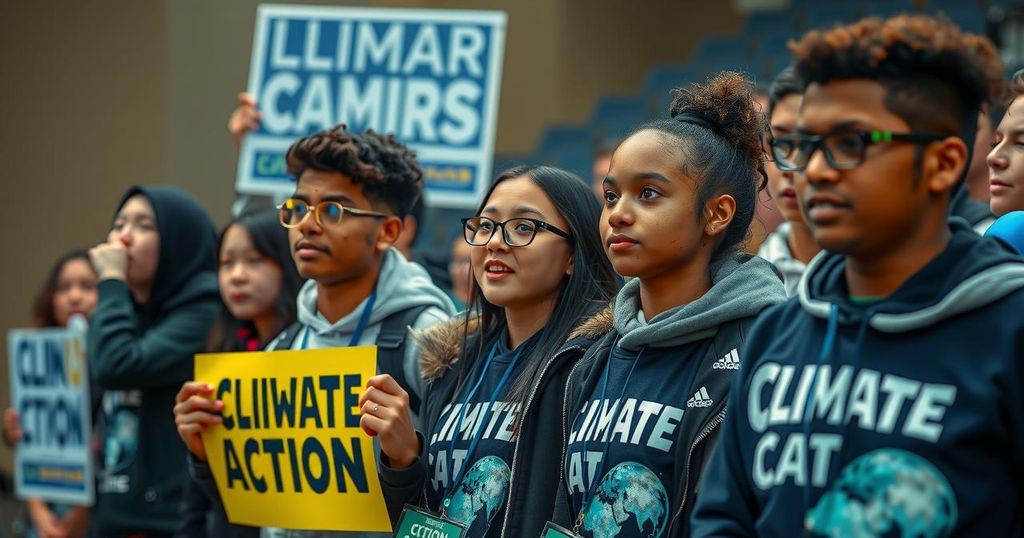Climate change
Politics
ASIA, AZERBAIJAN, BAKU, CLIMATE CHANGE, COP, DEMOCRACY, EUROPE, FELIPE PAULLIER, GERMANY, GOVERNMENT POLICY, IMMIGRATION, KITTY VAN DER HEIJDEN, MARINE, MARINEL UBALDO, PARIS AGREEMENT, PHILIPPINES, U. N, U. S, UN, UNICEF, UNITED NATIONS, UNITED NATIONS YOUTH OFFICE
Leila Ramsay
0 Comments
Youth Voices at U.N. Climate Talks: Balancing Anger with Hope for Change
Youth attending the U.N. climate talks express frustration and anger due to climate change’s severe impacts on their lives and communities. Despite feeling burdened by the weight of advocacy and a perceived lack of progress, they maintain a sense of hope and determination to influence global policies. Key voices emphasize the urgent need for institutional recognition of youth perspectives in climate negotiations.
Young individuals attending the United Nations climate talks are grappling with significant anger stemming from personal losses due to climate change, including family and community displacements. Despite these hardships, they maintain a steadfast hope for the future. Marinel Ubaldo, who has firsthand experience with devastating typhoons, expresses her optimism for clarity from the conference, although she acknowledges her frustration as she feels like merely a symbol for the cause. The conference this year sees diminished attendance from global leaders, mirroring a waning political commitment in key nations concerning climate action. This backdrop combines with tightened restrictions on public protests and the logistical challenges for youth from climate-affected regions that hinder their participation. Felipe Paullier from the U.N. emphasizes the necessity of integrating youth perspectives into official negotiations. UNICEF official Kitty van der Heijden highlights the unique vulnerability of children to climate impacts, reinforcing the urgency of addressing these issues effectively. Many youth report feeling fatigued from their efforts to advocate for change without perceivable progress, reflecting a growing sense of responsibility paired with disillusionment. Fathimath Raaia Shareef of the Maldives, haunted by fears for her homeland’s future due to rising sea levels, epitomizes this struggle, noting the difficulty in focusing on other aspects of life when her community’s very existence is precarious. Francisco Vera Manzanares of Colombia also voices concerns about the pace of global action and the necessity for substantial adult support in their advocacy efforts. They argue that their rights and future depend on meaningful engagement in climate dialogues.
The U.N. climate conferences serve as pivotal platforms for discussions and negotiations about global climate policy and action. Over recent years, the participation of youth activists has grown, reflecting their urgent concerns about the implications of climate change on their futures. Many young attendees have personal stories illustrating the detrimental effects of climate-related disasters, leading them to actively engage in these international forums. Despite their fervent advocacy, there is a palpable frustration regarding the slow pace of action from global leaders in addressing climate change.
In conclusion, young people are increasingly motivated to advocate for climate action at the U.N. climate talks, driven by personal experiences of loss and the need for effective change. Their voices articulate a blend of anger and hopeful determination, even amid frustrations over the lack of substantial progress. The call for greater institutional recognition of youth perspectives highlights the essential role they play in shaping the dialogue surrounding climate policy and action, emphasizing the right to a sustainable future.
Original Source: www.detroitnews.com




Post Comment